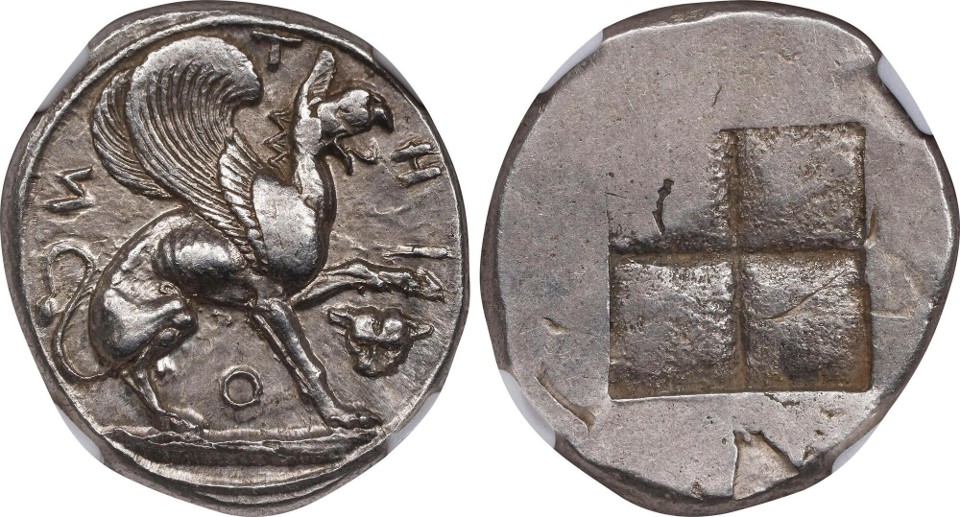29126 - Teos (stater griffin/incuse square) over Aegina (turtle/windmill) (Stack's Bowers Galleries, 17 Jan. 2025, 31082)
From SILVER
478 BCE - 465 BCE
Images
Overstriking coin

Teos_Stack's_Bowers_Galleries, _17_Jan._2025, _31082.jpg [1]
Location/history
| Sale(s)Sale(s) ᵖ: | Stack's Bowers Galleries, 17 Jan. 2025, 31082. | |
| Private collection(s)Private collection(s) ᵖ: | From the S. P. Rutherford Collection. |
Overstriking coin
Description
| ObverseInscription or printing placed on the obverse.: | Griffin seated right, raising forepaw, on ornate ground line, below raised forepaw, facing panther head | ReverseInscription or printing placed on the reverse.: | Quadripartite incuse square |
Mint and issuing power
| MintIdentifies the place of manufacture or issue of a numismatic object.: | Teos | Ancient regionAncient region. | Ionia | Modern countryModern country: Turkey | AuthorityIdentifies the issuing power. The authority can be "pretended" when the name or the portrait of X is on the coin but he/she was not the issuing power. It can also be "uncertain" when there is no mention of X on the coin but he/she was the issuing power according to the historical sources: |
Chronology
| FromIdentifies the initial date in a range assigned in a numismatic context. 478 BCE toIdentifies the final date in a range assigned in a numismatic context.. 465 BCE | Classical 480-323 BC |
Physical description
| MetalThe physical material (usually metal) from which an object is made.: Silver |
WeightWeight of the numismatic object (in grams). in grams: 11.9511.95 g <br />11,950 mg <br /> | DenominationTerm indicating the value of a numismatic object. Examples: tetradrachm, chalkous, denarius.: stater |
|
References
| Coin referenceReference of the Coin: | Coin series referenceReference to coin series study: | Balcer 19681Balcer 1968, n° 25,4a | |
| Coin series web referenceCoin series web references: | |||
Overstruck type
Description
| ObverseInscription or printing placed on the obverse.: | Turtle | ReverseInscription or printing placed on the reverse.: | Incuse square |
Mint and issuing power
| MintIdentifies the place of manufacture or issue of a numismatic object. ᵖ: | Aegina | Ancient regionAncient region. ᵖ | Attica | Modern countryModern country: Greece | AuthorityIdentifies the authority in whose name (explicitly or implicitly) a numismatic object was issued. ᵖ: |
Chronology
| FromIdentifies the initial date in a range assigned in a numismatic context. 470 BCE toIdentifies the final date in a range assigned in a numismatic context.. 450 BCE | Archaic until 480 BC |
Physical description
| DenominationTerm indicating the value of a numismatic object. Examples: tetradrachm, chalkous, denarius. ᵖ: | stater |
StandardStandard. ᵖ: | Aeginetic |
References
| Coin type referenceReference to coin series study ᵖ: | HGC 62HGC 6, n° 429, Meadows (forthcoming)3Meadows (forthcoming), Groups IIa-IIb | ||
| Coin series web reference overstruckCoin series web references overstruck: | |||
Additional data
| Frequency of overstrikesFrequency of overstrikes: | frequent | Level of confidenceLevel of confidence of the identification: | strong |
| RemarksRemarks: | "Overstruck" | ||
References
- ^ Balcer, Jack M. (1968), "The early silver coinage of Teos", Revue Suisse de Numismatique 47, p. 5-50.
- ^ Hoover, Oliver D. (2010), The Handbook of Greek Coinage Series, volume 6 : handbook of coins of the islands: Adriatic, Iionian, Thracian, Aegean, and Carpathian seas (excluding Crete and Cyprus), sixth to first centuries BC, Lancaster, 358 p.
- ^ Meadows, Andrew (forthcoming), Greek coinage in the Persian Empire: The Malayer 1934 Hoard (IGCH 1790).
